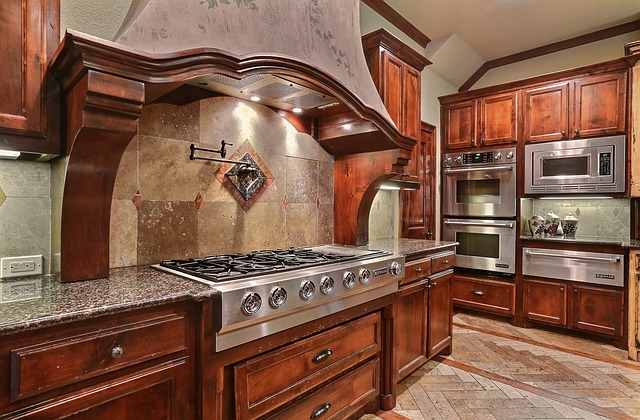For an eco-friendly kitchen makeover, prioritize sustainable kitchen design using recycled, bamboo, or reclaimed wood cabinetry and eco-labeled items. Choose eco-friendly countertops like recycled glass or natural stone to enhance environmental friendliness. Implement low-VOC finishes for improved air quality. These strategies create energy-efficient kitchens that are aesthetically pleasing while reducing your carbon footprint through green kitchen renovation practices.
Looking to transform your kitchen into an eco-friendly oasis? This guide explores ethical and low-impact updates for every corner of your culinary space. From choosing sustainable cabinets and storage solutions made from recycled materials, to selecting eco-conscious countertops and energy-efficient appliances, we’ll navigate you through a green renovation journey. Discover reclaimed wood, local materials, and innovative designs that reduce your environmental footprint without compromising style or functionality. Embrace a healthier planet, one kitchen update at a time.
- Choosing Sustainable Cabinets and Storage Solutions
- – Exploring eco-friendly cabinetry options
- – Tips for selecting recycled materials
- – The impact of sustainable storage design
Choosing Sustainable Cabinets and Storage Solutions
When considering an eco-friendly kitchen makeover, one of the first places to start is with sustainable cabinets and storage solutions. Opting for cabinetry made from recycled materials or quickly renewable resources like bamboo or reclaimed wood significantly reduces your environmental impact. These choices not only decrease deforestation but also cut down on the energy and water consumption associated with traditional manufacturing methods.
Furthermore, look for products certified by reputable eco-labeling programs to ensure they meet certain sustainability standards. Sustainable countertops made from materials like recycled glass, composted wood, or natural stone are another excellent option. These materials not only reduce waste but also offer a range of aesthetically pleasing options that can elevate your kitchen’s design while keeping it kind to the planet. Consider low-VOC (volatile organic compound) finishes for cabinets and countertops to ensure better air quality in your home during and after renovation, making your space both eco-friendly and healthy.
– Exploring eco-friendly cabinetry options
When considering an ethical and low-impact kitchen update, exploring eco-friendly cabinetry options is a great starting point. Sustainable kitchen design incorporates materials that minimize environmental harm, from recycled and reclaimed wood to certified sustainable finishes. These choices not only reduce your carbon footprint but also contribute to a healthier living space by eliminating harmful chemicals like VOCs (volatile organic compounds).
Eco-friendly countertops, another crucial element in green kitchen renovation, offer similar benefits. Opting for surfaces made from natural, locally sourced materials or recycled content can significantly lower the energy consumption and waste associated with traditional countertop production. These options not only look great but also align with the latest trends in energy-efficient kitchens, ensuring your space is both stylish and sustainable.
– Tips for selecting recycled materials
When planning an eco-friendly kitchen remodeling, selecting recycled materials is a powerful way to reduce your project’s environmental impact. Look for sustainable cabinetry made from reclaimed wood or certified wood from well-managed forests. These options not only minimize waste but also add unique character and charm to your space. Additionally, consider recycled kitchen materials like countertops crafted from repurposed glass, stone, or even plastic bottles. This reduces the need for new resource extraction and minimizes your carbon footprint.
For an truly green kitchen renovation, opt for eco-friendly countertops with low-VOC finishes. These not only look stunning but also contribute to better indoor air quality. Incorporating recycled materials into your design not only supports sustainable practices but also aligns with energy-efficient kitchens, ensuring your space is both environmentally friendly and aesthetically pleasing.
– The impact of sustainable storage design
Sustainable storage design plays a significant role in creating an eco-friendly kitchen. Incorporating features like built-in shelving, vertical storage solutions, and multi-purpose cabinets not only optimizes space but also reduces the need for additional furniture, thereby minimizing waste and carbon footprint. Opting for cabinetry made from recycled or sustainably sourced materials, such as bamboo, reclaimed wood, or engineered woods certified by the Forest Stewardship Council (FSC), contributes to a greener kitchen environment.
Additionally, choosing eco-friendly countertops like granite, quartz, or recycled glass can significantly lower energy consumption and emissions associated with manufacturing. Avoiding materials with high volatile organic compound (VOC) levels is crucial for minimizing indoor air pollution, ensuring a healthier living space. Combining these design elements with energy-efficient appliances and proper insulation results in an elegant, functional, and environmentally conscious kitchen that aligns with the principles of green kitchen renovation and low-VOC remodeling.
In the pursuit of an ethical and low-impact kitchen update, embracing sustainable cabinetry, recycled materials, and eco-friendly countertops is not just a trend but a responsible choice. By opting for green kitchen renovation ideas, you contribute to minimizing waste, reducing energy consumption, and fostering a healthier environment. A low-VOC kitchen remodel ensures your space is not only aesthetically pleasing but also free from harmful chemicals. Remember, every small step towards sustainable kitchen design makes a significant difference in the world of eco-friendly home transformations.
